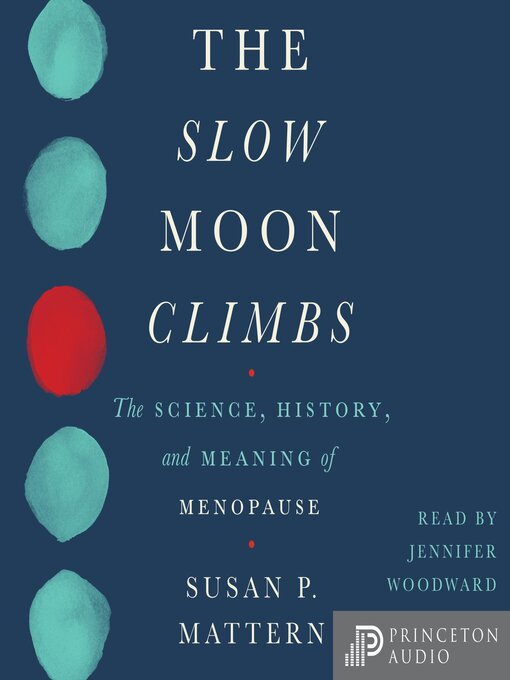- Fiction
- Nonfiction
- Biographies and Autobiographies
- Religion and Spirituality
- Politics
- Battle of the Books 2023
- RCCC Library Picks
- See all dogwood digital library's collections collections
The Slow Moon Climbs
The Science, History, and Meaning of Menopause
-
Creators
-
Publisher
-
Release date
October 8, 2019 -
Formats
-
OverDrive Listen audiobook
- ISBN: 9780691199153
- File size: 458594 KB
- Duration: 15:55:24
-
-
Languages
- English
-
Reviews
-
Kirkus
July 15, 2019
A celebration of menopause as a life stage vital to our species' survival, but one that has now been trivialized as a disease to be treated. Mattern (History/Univ. of Georgia; The Prince of Medicine: Galen in the Roman Empire, 2016, etc.) begins by noting that menopause--the end of the reproductive phase of female life and the beginning of an extended period of aging--is rare outside of humans. Most female animals die within a few years of their last birth, including our primate relatives. The author elaborates on the "grandmother hypothesis." Older women are more experienced, and, freed from giving birth themselves, they can assist daughters in childbirth and child-rearing. In Paleolithic times, when roving bands survived by foraging, these elders knew where to find the good plants. They also added to the number of adults as resources as opposed to dependent children. Menopausal women continued to be important in agrarian times when families settled on farm plots and society became patriarchal, with fathers owning the land and ruling the family. There were booms and busts over that 10,000-year period, and Mattern discusses the forces that kept population levels relatively stable. Everything changed with the Industrial Revolution and the advent of modern medicine, ushering in the modern era of massive population growth and lowered mortality. While menopause has been recognized as a stage of life for thousands of years, it was only in the early 18th century that the term began to incorporate negative ideas of excess blood, hysteria, irritable nerves, and so on. By the time hormones were discovered, menopause was considered an estrogen deficiency disease. The last third of the book embodies Mattern's well-argued case that menopause could be considered a "cultural syndrome": a set of symptoms, largely unclear in origin, that reflect psychological, social, and physiological factors that can create real problems and suffering. A wise history of a subject that is "deeply...implicated in the human condition."COPYRIGHT(2019) Kirkus Reviews, ALL RIGHTS RESERVED.
-
Formats
- OverDrive Listen audiobook
subjects
Languages
- English
Loading
Why is availability limited?
×Availability can change throughout the month based on the library's budget. You can still place a hold on the title, and your hold will be automatically filled as soon as the title is available again.
The Kindle Book format for this title is not supported on:
×Read-along ebook
×The OverDrive Read format of this ebook has professional narration that plays while you read in your browser. Learn more here.

